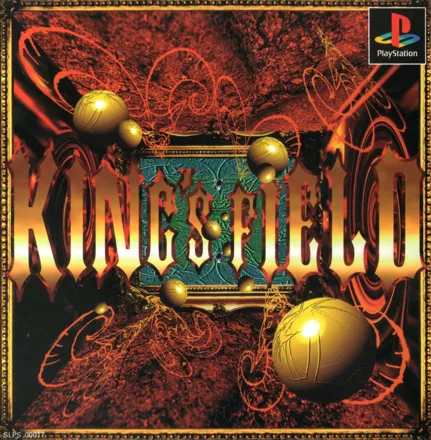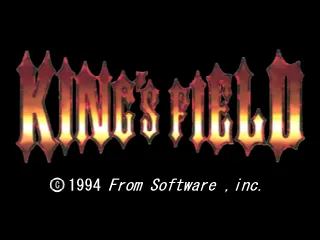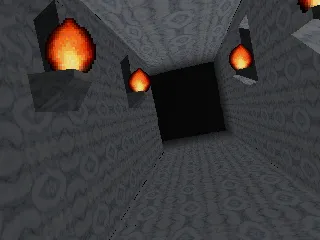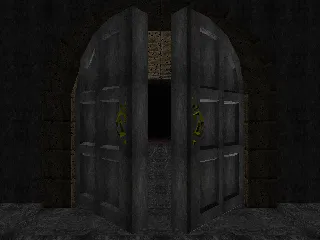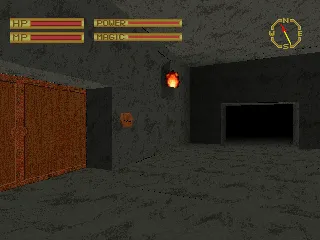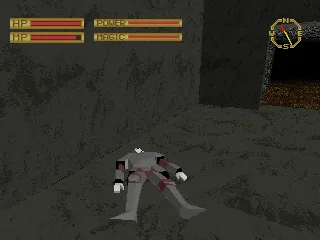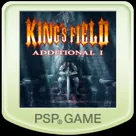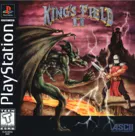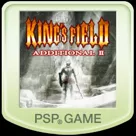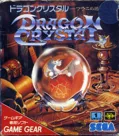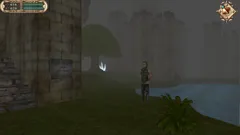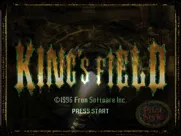King's Field
Description
The country of Verdite has descended into decay. Its royal family began practicing dark magic, guided by evil forces lurking beneath the surface of the country. A remote descendant of the cursed bloodline, Zoela Reinhardt, married the captain of the king's guards, Houser Forester. This valiant man went off to fight horrifying creatures that appeared within the Royal Cemetery. He has not returned, and neither did anyone who accompanied him. His son, John Alfred, ventured into the depths of the cemetery, determined to find out what has happened and whether there was still a chance to rescue his father.
The original King's Field is the first of the first-person fantasy RPG King's Field series and is notable for being one of the first fully polygonal 3D games. It was released in Japan weeks after the launch of the PlayStation, and never localized or released elsewhere. When King's Field II was later released in the West, it was renamed King's Field for those regions. The journey takes John Alfred Forester through a five-level dungeon populated by a few friendly NPCs and deadly traps and monsters. The entire world, including objects, enemies, and the player's own equipment, is rendered with 3D textured polygons.
The player collects gold and items from slain enemies, and can purchase weapons and spells at two shops located within the dungeon. Weapons and magic are assigned to different buttons so the player can easily attack with both, however, recharging action bars for each prevent rapidly spamming attacks. Skills and stats increase with use, and items can be bought or collected that raise specific stats when used (green Verdite stones raise magic, for example). The final boss can only be defeated with magic, encouraging players to grind a well-rounded character to a maximum level.
Each level of the dungeon holds enemies more difficult than the last, as well as greater rewards. The game takes place entirely within the narrow walls of the dungeon, with the only "safe" areas on the first floor. Players can save their progress to the memory card by activating crosses mounted on walls throughout the levels.
Spellings
- キングスフィールド - Japanese spelling
Groups +
Screenshots
Credits (PlayStation version)
22 People
| Staff | |
| Music Composer | |
| Sound Effect Programmer | |
| © |
|
Reviews
Critics
Average score: 40% (based on 2 ratings)
Players
Average score: 3.5 out of 5 (based on 12 ratings with 1 reviews)
Polygonal revolution with RPG bliss
The Good
In 1994, one of the most glorious years in the history of video games, a software developer named FromSoftware released their first game, King's Field. Inexplicably ignored and forgotten by the mainstream community, supported only by a handful of faithful followers, it was a revolutionary title that deserves more than a passing mention in the honorable annals of role-playing games. King's Field was instrumental in shaping first-person 3D action RPGs, together with much better-known games such as Ultima Underworld and the later Arena. The unknown Japanese developers created a true marvel by deliberately distancing themselves from the tradition of RPG design in their land, and looking up to the amazing Ultima Underworld for inspiration. As a result they produced an outstanding game way ahead of its time.
Ultima Underworld games were much more detailed and interactive than King's Field, offering richer and deeper role-playing. But in terms of pure physical immersion King's Field gains the upper hand. The entire world in this game is fully polygonal. I don't recall another RPG, or possibly even another game in general of that early 3D era that did that. Two years had to pass before Quake demonstrated a fast engine operating in a world consisting entirely of polygons. Naturally, King's Field would have never been able to compete with it in speed, but it wasn't about speed anyway: it was about immersion. And that is done masterfully, at first purely from a technological standpoint. The homogeneous world feels much more realistic thanks to its technically consistent design. Instead of a window we have full-screen glory, and instead of sprites flickering on the screen we see intimidating 3D models coming right at us. King's Field should have been commemorated and respected even if it were only a technological achievement.
But the game is much more than that. King's Field has incredible atmosphere sustained by tight visual design, beautifully ominous music, and poignant sound effects. You'll rely on your ears as well as on your eyes to find out if there is a scary monster lurking just beyond the corner. As you explore the environments you'll become gradually immersed into this dark, hostile world, almost in a System Shock-like fashion, creeping through the caves, looking for safe spots, always alert and aware of danger. Once you let the game suck you in it settles in your mind and refuses to let go.
One of the reasons for that is its superb level design. King's Field is a semi-open game in that it lets you take any path you see fit to explore right from the beginning, but blocks certain areas by requiring you to procure specific items to enter them. The remaining space, however, consists of sprawling areas that can be explored in any way and order. You can carefully step into a corridor with a few snakes crawling and level up near a save point before you figure out a better plan. You can venture straight into a room populated by enemies you don't stand a chance of defeating yet, trying to make a mad rush for a much-needed map before skeletons and mummies beat you to a pulp. The non-linearity of the design is also evident in the placement of enemies and items: with enough curiosity and persistence you'll be able to find most of the game's best equipment without having to pay for it. In short, King's Field is a game that lets you choose your own pace, which is, in my opinion, a very important ingredient of RPG design.
The game never holds your hand, requiring you to figure out on your own where to go and what to do. Yet it never just throws you into a boundless world without any objectives. You'll make several trips here and there, note the landmarks, find shortcuts, learn how to distinguish relatively safe areas from dangerous ones that you'd better stay away from for now. After a while you'll familiarize yourself with the level and greet it like an old friend when you return to it from areas yet uncharted. Meticulous exploration always pays off, and the emotion you'll experience after having studied and understood a level's layout is that of deep satisfaction and proud joy. King's Field is worth playing simply for staying and exploring its intricate world, soaking in its vibes.
There is more depth and meaning to the exploration, though, as it is intertwined with a robust, balanced, gratifying role-playing system. Yes, it is quite simple: fight enemies, get experience points, level up, find better gear. But the sheer satisfaction you feel after knocking down once fearsome opponents with one well-placed swing of your new axe wielded by a stronger hand makes up for the simplicity. You don't really need any gimmicks if you have the basics executed really well. And that's exactly what King's Field does. It doesn't pretend to be something it is not, it doesn't throw fancy, pretentious gameplay features at you, it just gives you challenging, rewarding action role-playing in revolutionary 3D. It wants you, the player, to shield the protagonist from all dangers, and it excels at creating an illusion of having no help in that but yourself. It relies on your resourcefulness, determination, patience, courage, and cleverness to beat it. It is truly a game created for people who know exactly what they want, establishing a system of mutual trust and understanding right off the bat.
Combat in King's Field may seem inept to those who just tried playing the game for a few minutes. In the beginning it looks like you can't even hurt an enemy. Indeed, the game's high difficulty level requires you to grow stronger in order to stand a chance against tougher foes. However, the greatness of King's Field is in that it also offers you purely action-oriented challenge and gives you enough freedom in combining aspects of character growth and precise tactics to overcome your foes. In other words, you can grind until you overpower yourself, or you can rely on your skill. In reality, you will probably do a bit of both. However, the game always does its best to remind you that you should play smart and not just crunch numbers. Even enemies way below your level may manage to kill you if you charge at them in a mad frontal assault without any precautions taken. Much of the success in combat depends on your ability to strafe, circling around enemies and attacking them from behind, which naturally deals more damage than trying to clash swords with a fearsome skeleton just when he is about to strike.
There is more depth in the game's system than one may think in the beginning. There are three different types of physical damage, and you'll want to try out different weapons against different foes to find out what they are weak to and adapt accordingly. Your parameters increase gradually regardless of your levels if you favor certain types of attacks over others. There is a wealth of equipment, accessories, and items. And there is an effective magic system that adds shooter-like elements to the game, allowing interesting tactical choices such as hitting from afar enemies who are not even aware of your presence or cannot reach you for some reason.
Finally, the story in King's Field is sparse, but you will meet various NPCs, some of which have little stories of their own. Someone may mention a friend who was lost in the depths of the dungeon, and several hours later you would find his corpse in a lair of killer trees. You'll need the clues from these people to solve many tasks of the game, and they seem to be more organically patched into the dungeon crawler template than in most comparable cases. Even the merchants have something to say that would at least explain their presence in the desolate place. The deeper you delve into the dungeon, the less friendly NPCs you will see, and the first level will soon look like lost paradise in your eyes as the atmosphere darkens more and more.
The Bad
King's Field is a game for patient people, or at least for people like me, who like deep and rewarding role-playing games enough to gather the little patience we have. It has a very steep learning curve and will absolutely not appeal to anyone expecting instant gratification from their games. It requires you to work hard, and actually pays off more in the end than most other games out there. but it doesn't offer any guidance or solace until you master it on your own. The first few hours are probably the hardest ones: even though later levels are more challenging, it's the initial hurdle of being thrown into an overwhelmingly hostile world that confuses and alienates players. It took me several attempts to get into the game, but I'm glad I threw away my prejudices and was stubborn enough to persevere.
I was able to accept the slow walking speed, but naturally the sprint function implemented in later games would have been welcome already in this first installment. More difficult to deal with is the very slow turning, which makes the protagonist even more clumsy without a good reason: surely a person who has enough strength and agility to hack undead warriors with a heavy axe can turn with the same speed. Depriving him of that calls forth more annoyances in the already uncomfortable battles, making them border on awkward.
Locations are functional, but mostly lack textures and detail, which would certainly make them even more atmospheric. There are many disappointingly bland, rectangular rooms looking too similar to each other. A few areas actually manage to be beautiful despite the technological limitations, but perhaps it was impossible to avoid repetitiveness in the ambitious endeavor.
The Bottom Line
A criminally overlooked classic, King's Field is much more than just a technologically groundbreaking product: it is an engrossing, atmospheric, addictive RPG with wonderful level design and playability that exceeds the boundaries of time. Its sequels may have improved and refined the formula, but this one is the venerable pioneer that has started it all and can still be enjoyed to the full today.
PlayStation · by Unicorn Lynx (181645) · 2013
Trivia
Moonlight Sword
The Moonlight Sword (a reoccurring object in the series) is introduced in this game. The player can find a stone Dragon Sword within the dungeon. A fairy on the fifth floor will convert the sword into the powerful Moonlight Sword.
Analytics
Upgrade to MobyPro to view research rankings and price history! (when applicable)
Identifiers +
Contribute
Are you familiar with this game? Help document and preserve this entry in video game history! If your contribution is approved, you will earn points and be credited as a contributor.
Contributors to this Entry
Game added by BurningStickMan.
PS Vita added by Fred VT.
Additional contributors: TechSmurfy, firefang9212.
Game added January 11, 2011. Last modified May 29, 2024.


